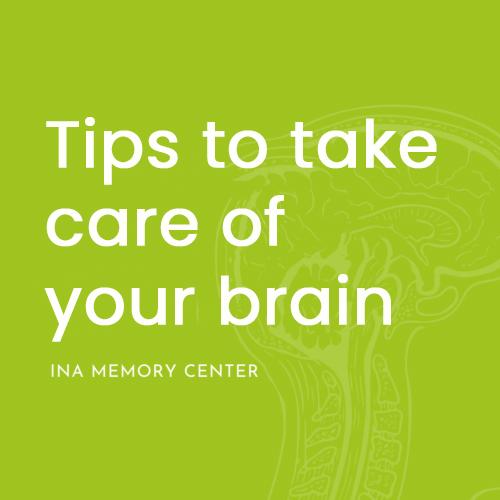Because each human being is singular and unique, at INA Memory Center we work in a multidisciplinary way to understand and meet the needs of each person and their environment globally and holistically.

The services we offer are:
What do we do? High-intensity neurorehabilitation
- Neurology
- Neuro-psychology
- Neuro-physiotherapy
- Neuro-speech therapy
- Multisensory therapy
- Family assistance
Neurology is a field of medicine that studies the structure, function and development of the (central, peripheral and autonomic nervous) and muscular systems in a normal and pathological state. This science deals in an integral way with medical care for the neurological patient, with teaching in all matters that affect the nervous system and with research.
At Ina Memory Center, we have a team led by Dr José María González whose objective will be to diagnose and treat disorders that affect the brain, spinal cord, nerves, muscles and pain. As well as diseases such as head injuries, brain tumours, among other pathologies. In addition to the pharmacological part, his team has its line of research and intervention in healthy lifestyles to prevent possible neurodegenerative pathologies.

- Alzheimer’s
- Parkinson’s
- Stroke
- Head Trauma
- Cognitive impairment
- Tumours
- Gait disorders
Neuropsychology is the discipline that studies the relationships between cognitive, emotional and behavioural.
At INA Memory Center, from the team led by Lidia Pérez, we focus on the intervention of altered functions in any of the areas in people who have suffered Acquired Brain Damage or have neurodegenerative diseases.
Treatment consists of an initial assessment and individualized treatment proposal, with a common goal that involves the active participation of the patient and her environment.
The techniques we use are at the forefront of therapeutic innovation, with an ecological approach and generalization to daily activities.

- Alterations in language
- Memory disturbances
- Attention-deficit
- Alteration in executive function
- Agnosia
- Apraxias
- Spatial and/or temporal disorientation
- Alteration in social cognition
- Intervention in awareness of deficits
- Emotional intervention (apathy, high motivation, low tolerance for frustration, depression, anxiety, etc.)
- Behavioural intervention (aggressiveness, impulsivity, disinhibition, etc.)
Neurological physiotherapy is a branch of physiotherapy that is responsible for treating the effects caused by an injury to the nervous system, which affects the biomechanics of the person.
These affectations can occur by altering physical aspects such as posture, balance, movement, muscle tone and strength, both superficial and deep sensitivity, etc.
In the team led by Marta Coll we treat all these physical problems but take into account that, in turn, they are frequently associated with cognitive, behavioural, psychological, social or occupational disorders, which must be treated in a combined way to achieve maximum functionality and patient autonomy.
Therefore, the treatment consists of an initial assessment and an individualized treatment proposal adapting to each person.
At INA Memory Center we are committed to innovation, research and the humanization of therapies and that is why we are the pioneers in implementing high-intensity intelligent robotics in all our therapies. You can see more information on the website of our Neuroemotion Neurology Center.

The team led by Sergi Romera is in charge of neuro-speech therapy to work on the damage that neurological diseases or brain damage can cause at a communication level, that is, the treatment will focus on communication difficulties and swallowing so that the patient can improve the communication difficulties that may exist in each case.
Our team of neuro-speech therapists performs treatments focused on the rehabilitation of communication, language and voice rehabilitation.
We are going to do this with specific training that will allow us to address the communication problems existing in each of the patients. Therefore, the speech therapy team will work on problems related to:

- Difficulty modulating and using the sounds necessary for speech.
- Understanding and use of language problems.
- Voice problems
- Swallowing difficulties
In Memory Center, we have a Snoezelen room to work on sensory stimulation.
From sensations and perceptions, the idea of movement, cognitive processes and language is created. Therefore, it is necessary to stimulate the integration of sensory information, to recover and improve the capacities of people with some pathology. It also always provides a feeling of tranquillity and well-being due to being a pleasant and comfortable space with soft and pleasant stimuli.
As well, curiosity and interaction with the environment are encouraged and joint relaxation is achieved.
The therapy in this room is directed by different professionals depending on the case to be treated, focusing the treatment from their field or combining several.

- Stroke
- Neurodegenerative diseases
- Sensory integration disorders
- Movement and/or sensitivity disorders
- Anxiety and depression disorders
The role of the family and social environment of our patients is the main pillar. For this reason, they are done periodically with the different professionals, to adapt the objectives of the treatment with the difficulties they have in their day to day, facilitate the generalization of the trained skills and promote the motivation of the patient.
The collaboration and cooperation of the family are essential for the treatment of our patients. For this reason, we have our patient-centre-family communication system in which we facilitate and favour this triangle, we have our feedback in each session.

- Orientation and information
- Assess real difficulties in activities of daily living
- Psychoeducation
- Emotional support
- Guidelines and Guides
‘There are no individuals with brain injury, but families affected by brain damage’ (Powell, 1994).

